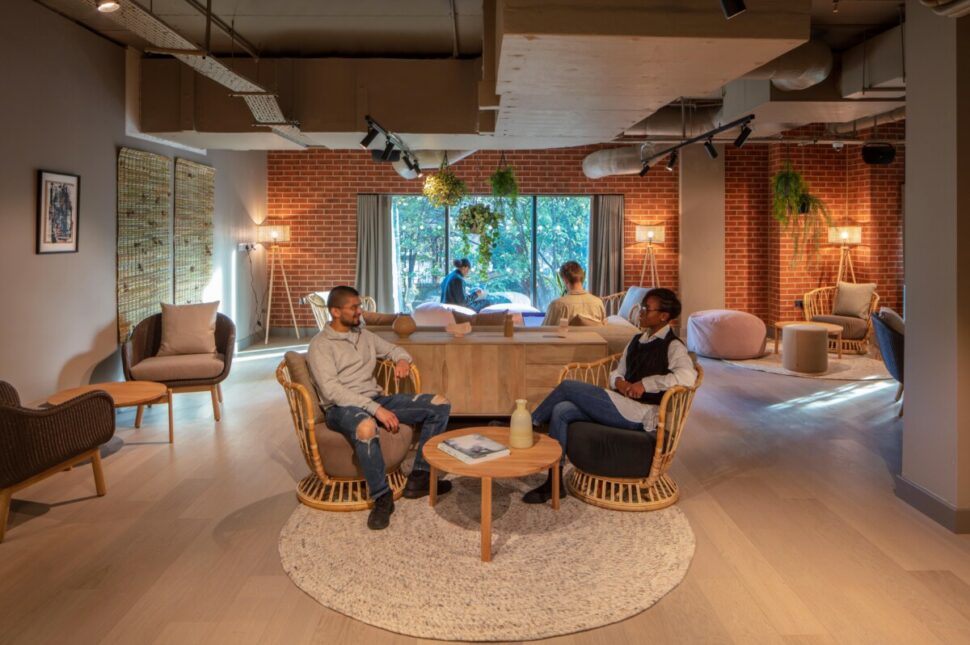What is co-living and is it right for you? We take a look at this increasingly popular form of housing and answer the most commonly-asked questions around this type of rental property.
Co-living FAQs
Although you’ve probably heard the term co-living in the press recently, the idea itself is not a new one. Its roots can be traced back to early shared housing in cities like London and New York. However, it’s now gaining major traction among younger renters due to current economic and lifestyle factors.
Co-living offers good value accommodation for many renters priced out of home ownership and wary of renting with private landlords. it blends the benefits of having your own living space – whether that’s your own bedroom, studio or entire apartment – with sociable, communal living. This may involved sharing some facilties, or not, depending on the scheme.
Coliving also fits with the ‘gig economy’ and more flexible working practices that are now common. In line with this, co-living leases offer everything from a nightly rate for short stays up to long leases for a year or more.

Coliving FAQs
What does co-living mean?
Co-living is an increasingly popular form of communal living where residents share certain amenities and communal areas while also enjoying their own private space. This type of accommodation is growing in popularity, especially in cities.
The high cost of homes and the limited space available in urban locations means co-living can offer a lower-priced option over self-contained living spaces. Co-living can often also offer very flexible arrangements for short- and medium-term lets.
What are co-living spaces?
Co-living spaces are buildings set up to facilitate communal living for groups of people who also benefit from having their own private space. Amenities such as laundry facilities, kitchenettes, bathrooms may be shared (or not), but residents do have their own living spaces.
Developments vary, but many include a wide range of communal facilities designed to help residents connect with each other. Communal dining rooms, libraries, pools, cinema rooms, games rooms – all these might be found in a typical co-living space.
Why choose co-living?
Co-living offers a number benefits over conventional renting options. Cost is a key factor for many people considering, as co-living can provide cheaper accommodation compared with other types of lettings. However, there are plenty of other benefits that make co-living attractive.
The ability to interact with other residents makes co-living a more sociable form of renting – especially useful for tenants who are new to an area or city. The types of facilities on offer in some co-living spaces are also a cut above what might be found in a conventional apartment block.
The environmental impact of living in a co-living space can also be low, thanks to shared amenities and fully-furnished homes, and the convenience of all-inclusive bills and services like room cleaning also add to the appeal of co-living.
Co-living provider spotlight

Folk Co-living
Folk Co-living is a London-based co-living brand. It gives residents a more stress-free, social way of renting, offering private studio apartments combined with shared social and work spaces such as gyms, lounges and terraces.
Folk currently operates three co-living developments across London. These are The Palm House in Harrow, Sunday Mills in Earlsfield, southwest London and Florence Dock in Battersea. You can find out more about Folk and each development by visiting its HomeViews page.
What are my options for co-living in London?
There are plenty of options for co-living in London. Vervlife offer two locations, while there are also plenty of other options around the city from operators like The Collective, Lyvly, Kndrd and LHA London.
If you’re looking for a sociable rental experience, but would prefer your own self-contained apartment, read our guide to the best young professional accommodation in London. These ‘Build to Rent’ apartments offer all-inclusive billing, furnishing options and outstanding communal events and facilities.
Is co-living safe?
Brands operating co-living spaces are very careful to maintain high safety standards for residents. Companies carefully screen both residents and staff. Additionally, most co-living spaces include a 24/7 concierge service to help manage the building.
You should look for a co-living space with up-to-date technology for entering and exiting the building. Building security or CCTV monitoring is also desirable to ensure you feel safe as a resident.

What does co-housing mean? Is it different to co-living?
The main difference between co-housing and co-living is that co-housing communities tend to be set up and run by the communities themselves. It’s a similar idea, aiming to create a more communal living arrangement with private homes and some shared facilities.
However, the community itself creates co-housing communities, rather than a company. Homes are also usually houses owned by the occupiers rather than rented apartments. The organising community may decide to form because of shared beliefs or values, such as environmental concerns. It’s also sometimes referred to as an ‘intentional community’.
What is collective housing?
Collective Housing is a broad term that covers various models of communal living, including co-housing and co-living. Collective housing refers to any collection of houses or apartments created for a single community that shares common spaces or amenities.
Co-living provider spotlight
Vervlife

Vervlife is a Wolverhampton-based operator with a focus on co-living developments. Its mission is to improve the wellness, health and happiness of residents while they stay in a VervLife development.
Vervlife currently has two co-living developments in its portfolio. The Locks in Wolverhampton offers 95 one and two-bedroom apartments, while Wembley Ark is located in the heart of the thriving Wembley regeneration zone. Find out more about Vervlife by visiting their HomeViews page.
What is a co-living hotel?
A co-living hotel may refer to a co-living space that offers short lets in a similar way to a hotel. As many co-living buildings are set up in a similar way to a hotel, you may be able to stay for as few as a couple of days or as many as 12 months or more. Pricing will vary accordingly.
Is co-living right for me?
Co-living can be a great way to settle into a new neighbourhood or city. Think of it like staying in a hotel while you settle in, but the other residents are in a similar situation and are open to meeting you!
Even if you’re established in an area, co-living can be a way for you to find new friends or connect with new business partners. Some co-living spaces also offer coworking spaces. This makes them attractive for people wanting to work from home, but with some interaction with other people.
Overall, co-living offers outstanding convenience and opportunities to meet other people at a lower cost than most conventional renting options. If you value community, convenience and cost-savings, it could well be for you!
Read more
What does co-working mean?
Co-working simply means a number of individuals sharing office space but not working for the same business. They may be self-employed or working for different companies, and may share only the space and essential facilities. In other coworking spaces, people might come together to share ideas or skills and help each other out with projects.
Will more co-living homes be built in London in 2023?
More co-living spaces are being built in London in 2023 in response to rising demand for this type of rental arrangement. Currently, there are around 31,000 co-living beds in operation and development.
The latest data (September 2023) from rental room search platform SpareRoom shows there is a shortfall of almost 12,000 rooms to rent in London alone.
HomeViews provides verified resident reviews of the UK’s housing developments. We’re working with developers, landlords and the Government to recognise high performers and help to improve standards in the built environment.



















